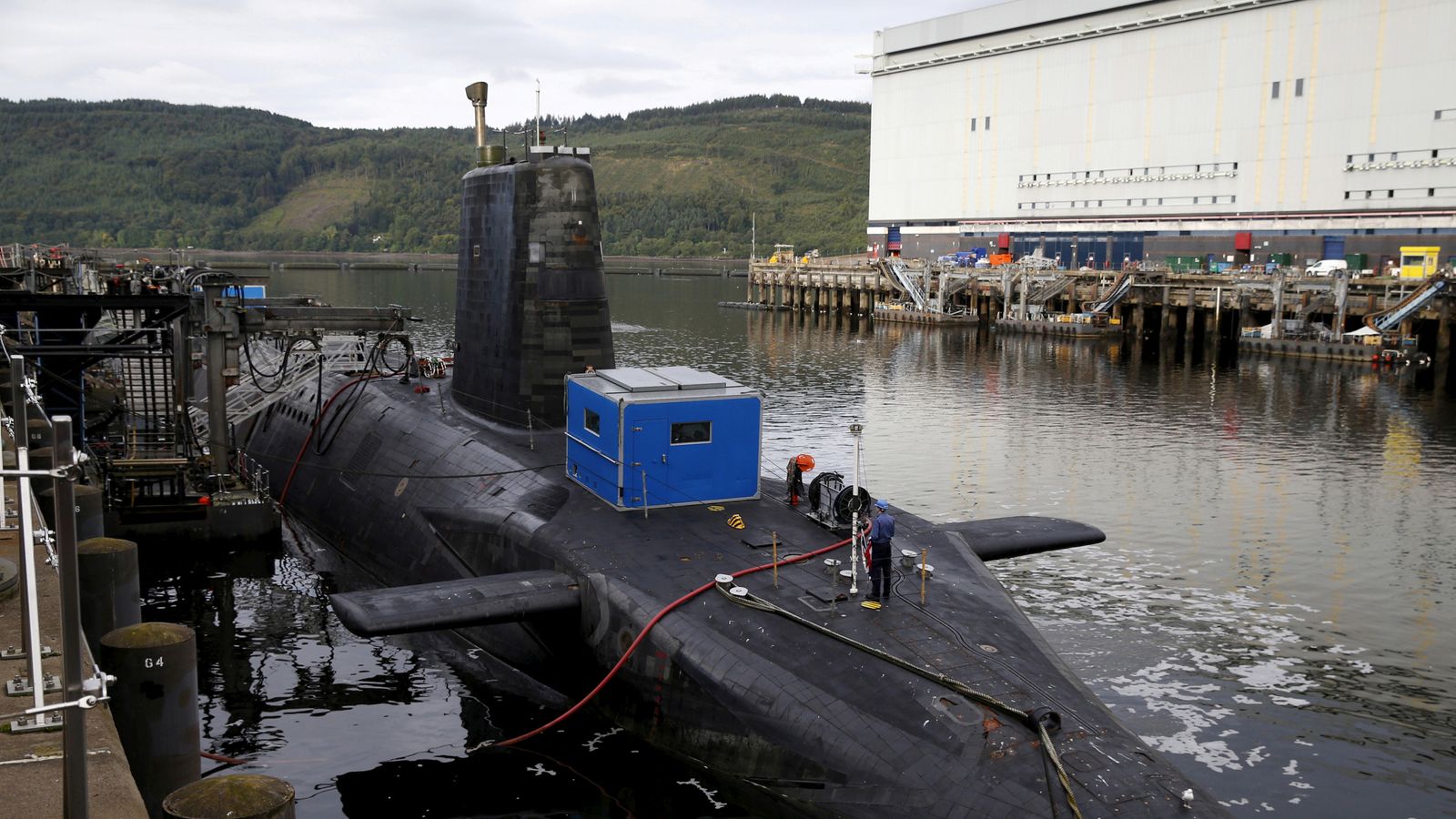The new security pact between Australia, the UK and the US – known as AUKUS – looks like being good news for British defence contractors.
It was notable that, announcing the new pact alongside US President Joe Biden and the Australian PM Scott Morrison, Boris Johnson mentioned, early on in his statement, the benefits for the UK economy.
Mr Johnson said the pact would create “hundreds of highly skilled jobs across the United Kingdom – including in Scotland, the North of England and the Midlands – taking forward this government’s driving purpose of levelling up across the whole country.”
Please use Chrome browser for a more accessible video player
He went on: “We will have a new opportunity to reinforce Britain’s place at the leading edge of science and technology, strengthening our national expertise.”
The government’s statement said: “The UK has built and operated world-class nuclear-powered submarines for over 60 years. We will therefore bring deep expertise and experience to the project through, for example, the work carried out by Rolls Royce near Derby and BAE Systems in Barrow.”
Investors have taken that at face value.
Shares of Rolls-Royce, the aerospace and defence supplier, were up by 4.5% at one point on Thursday, making it the biggest single gainer in the FTSE 100.
Premier League unveils Owners’ Charter to head off future breakaway threat
Gas price surge blamed for UK fertiliser factory shutdowns
M&S blames Brexit as it axes 11 French high street stores
And shares of BAE Systems, Britain’s premier defence contractor, were also up by 1%.
Both Rolls and BAE are expected to benefit from the US and the UK’s sharing of nuclear submarine technology with Canberra which, under the terms of the deal, will build eight nuclear-powered – but not nuclear-armed – submarines.
BAE owns a nuclear submarine building facility in Barrow-in-Furness, Cumbria, which completed its first submarine for the Royal Navy 120 years ago and which has been building nuclear submarines for the Royal Navy for six decades.
It started with HMS Dreadnought, on which work began in 1959 and which entered service in 1963. Previously part of the old Vickers Shipbuilding and Engineering (VSEL), it was bought by the late Lord Weinstock’s GEC in 1995, before becoming part of BAE in 1999.
Some 10,000 people are employed at Barrow, Britain’s biggest shipyard, where the fifth of seven Astute nuclear submarines is currently being built for the Royal Navy.
Barrow is also home to work being done by BAE, Rolls-Royce and the Submarine Delivery Agency to deliver Dreadnought, the successor to Vanguard, which launched in 1994 as part of the Trident nuclear programme.
BAE already has 4,000 employees in Australia and is currently building nine Hunter-class frigates for the Royal Australian Navy.
BAE said today: “As a company with a significant presence in all three markets [the US, UK and Australia], we stand ready to support the AUKUS discussions as they progress.”
Rolls-Royce has been involved with Britain’s nuclear submarines for just as long.
Please use Chrome browser for a more accessible video player
Its pressurised water reactors powered HMS Dreadnought and have powered all of the Royal Navy’s nuclear submarines since. More than 1,500 people are employed in the design, manufacture and maintenance of the plants and the secondary propulsion systems they power, most of them at the Rolls site at Raynesway, Derbyshire.
Rolls is currently carrying out early-stage work on a nuclear reactor that could power future attack submarines and it is thought the technology could also be applicable to the new Australian subs. Nuclear powered submarines are typically 8 knots faster and can stay submerged for longer than conventional submarines and, because they create less noise, are also harder to detect.
The third major player in the UK’s nuclear submarine sector is Babcock, which repairs and maintains a facility at Faslane, 25 miles west of Glasgow, which is home to the Vanguard and Astute fleets.
Please use Chrome browser for a more accessible video player
It also maintains the nuclear fleet at Devonport Royal Dockyard in Plymouth, which along with the nearby HM Naval Base Devonport, is the largest naval support site in western Europe. Shares of Babcock rose by 2% on Thursday.
If these three UK companies stand to benefit from the AUKUS pact, the likeliest loser appears to be the French aerospace and defence giant Thales, which owns 35% of Naval Group, the state-controlled defence and shipbuilding contractor, which had an A$50bn (£26.4bn) contract to deliver a conventional diesel-powered submarine fleet to the Royal Australian Navy that has now been superseded.
The contract had already overrun in both cost and time and there have reportedly been disputes with the Australian government over the design of the craft. Because the vessels were being built in Australia, not France, the resulting job losses will be in Adelaide rather than Toulon.
Thales insisted that the loss of the contract would have no material impact on its 2021 earnings but the loss of the contract is still a blow to Naval Group because it was seen as giving it credibility in bids for other submarine contracts with the likes of the Royal Netherlands Navy.
The new pact is expected to benefit other British businesses beyond BAE and Rolls because it is also likely to promote co-operation between Australia, the UK and the US in a host of related fields, including sonar technology, not to mention fields such as artificial intelligence and quantum technologies.
Please use Chrome browser for a more accessible video player
This sharing of information and technology could in turn support numerous companies in Rolls and BAE’s supply chains.
Ironically, that could include the UK arm of Thales, which has a contract to provide sonar systems to the Dreadnought project.






















